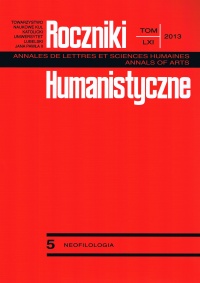Obraz człowieka w powieściach metafikcyjnych Johna Banville’a: Pochwała siły wyobraźni
Abstract
The essay analyzes how John Banville reconstructs the image of man in his two novels Kepler and Doctor Copernicus by means of broadly understood metafiction. The Author of the essay discusses the following elements: implied author’s and narrator’s power of creative imagination and Rheticus’s self-consciousness which enables to create fiction and intertextuality of the novel. When analyzing the last aspect of the novels, the Author mentions also Michel Foucault’s term, heterotopia. The results of this analysis are twofold. On the one hand, man has got practically unlimited creative imagination on their part. On the other hand, man seems to be lost in the world of unclear ontological boundaries, which proves a paradoxical image of man.
References
Ajdukiewicz, Kazimierz. Zagadnienia i kierunki filozofii. Warszawa: Czytelnik, 1983.
Barnes, Julian. Flaubert’s Parrot. New York: Vintage Books, 1990.
Barnes, Julian. The History of the World in 10 ½ Chapters. London: Picador, 2005.
Banville, John. Kepler. London: Picador, 1999.
Banville, John. Doctor Copernicus. London: Picador, 1999.
Banville, John. The Newton Letter: An Interlude. London: Secker & Warburg, 1983.
Banville, John. Mefisto. London: Picador, 1999.
Banville, John. The Book of Evidence. London: Picador, 1998.
Booker, M. Keith. “Cultural Crisis Then and Now: Science, Literature, and Religion in John Banville’s ‘Doctor Copernicus’ and ‘Kepler’.” Proquest Dissertations and Theses. Wisconsin: Marquette University, 2000. Proquest. 17 March 2012. <http://search.proquest.com/docview/304625906?accountid=136941>.
Butkatė, Jūratė. “Postmodern Transgressions of Narrative: An Intertextual Dialogue between J. Banville’s The Book of Evidence (1989) and V. Nabokov’s Lolita (1955).” Literatūra. 49.5 (2007): 17-25.
Copernicus, Nicolas. De Revolutionibus. Trans. Edward Rosen. Baltimore. The John Hopkins UP. 30 Dec. 2011. <http://www.webexhibits.org/calendars/year-textCopernicus.html>.
Egginton, William. “Reality is Bleeding: A Brief History of Film from the Sixteenth Century.” Configurations. Baltimore: The John Hopkins UP, 2001. 207-229.
Foucault, Michel. “Of Other Spaces.” Diacritics 16.1 (1986): 22-27. JSTOR. 03 May 2012. <http://www.jstor.org/stable/464648>.
Gingerich, Owen. “From Copernicus to Kepler: Heliocentrism as Model and as Reality.” Proceedings of the American Philosophical Society 117.6 (1973): 513-522. JSTOR. 14 Dec. 2011. <http://www.jstor.org/stable/986462>.
Gingerich, Owen and James MacLachlan. Nicolaus Copernicus: Making the Earth a Planet. Oxford: Oxford UP, 2005.
Hand, Derek. A History of the Irish Novel. Cambridge: Cambridge UP, 2011.
Hartner, Willy. “Copernicus, the Man, the Work, and Its History.” Proceedings of the American Philosophical Society 117.6 (1973): 413-422. JSTOR. 14 Dec. 2011. <http://www.jstor.org/ stable/986460>.
Hateley, Erica. “Flaubert’s Parrot as Modernist Quest.” Q/W/E/R/T/Y: Arts, Litteratures & Civilisations du Monde Anglophone 11 (2001): 177-181.
Hawthorn, Jeremy. Studying the Novel. London: Hodder Education, 2005.
Hutheon, Linda. A Poetics of Postmodernism: History, Theory, Fiction. London: Routledge, 2002.
Jameson, Frederic. “The Politics of Theory: Ideological Positions in the Postmodernist Debate.” Modern Criticism and Theory. Harlow: Longman, 1999. 348-359.
“John Kepler.” The Illustrated Magazine of Art 3.16 (1854): 233-234, JSTOR. 14 Dec. 2011. <http://www.jstor.org/stable/20538267>.
Kamiński, Stanisław. Nauka i metoda: Pojęcie nauki i klasyfikacja nauk. Lublin: Towarzystwo Naukowe KUL, 1992.
Lee, Alison. Realism and Power. London, Routledge: 1990.
Losse, John. Wprowadzenie do filozofii nauki. Warszawa: Prószyński i S-ka. 2001.
Matz, Jesse. “The Novel.” A Companion to Modernist Literature and Culture. Oxford: Blackwell Publishing, 2006. 215-226.
Mchale, Brian. Postmodernist Fiction. London: Routledge, 2004.
McIlroly, Brian. “Pattern in Chaos: John Banville’s Scientific Art.” Colby Quarterly 31.1 (1995): 74-80.
McMinn, Joseph. “Naming the World: Language and Experience in John Banville’ Fiction.” Irish University Review 23.2 (1993): 183-196. JSTOR. 14 Dec. 2011. <http://www.jstor.org/ stable/25484560>.
McMinn, Joseph. “An Exalted Naming: The Poetical Fictions of John Banville.” Canadian Journal of Irish Studies 14.1 (1988): 17-27. JSTOR. 14 Dec. 2011. <http://www.jstor.org/stable/ 25512722>.
McMinn, Joseph. “Versions of Banville: Versions of Modernism.” Contemporary Irish Fiction: Themes, Tropes, Theories. Eds. Liam Harte and Michael Parker. London: Macmillan, 2000. 79-99.
Moran, Heather Maureen. ‘Making Strange:’ The Art and Science of Selfhood in the Works of John Banville. Milwaukee, Wisconsin: Bell & Howell Information and Learning, 2000.
Nicol, Bran. “Postmodernism.” A Companion to Modernist Literature and Culture. Oxford: Blackwell, 2006. 565-570.
“Nicolaus Copernicus.” Encyclopædia Britannica. Encyclopædia Britannica Online. Encyclopædia Britannica Inc., 2011. Web. 11 Dec. 2011. <http://www.britannica.com/EBchecked/topic/ 136591/Nicolaus-Copernicus>.
Opperman, Serpil. “The Interplay Between Historicism and Textuality: Postmodern Histories.” Journal of Faculty Letters. 16.1 (1999): 13-27.
Opperman, Serpil. “Historicist Inquiry in The New Historicism and British Historiographic Metafiction.” Journal of Faculty Letters 15.1 (1998): 39-52.
Patten, Eve. “Contemporary Irish Fiction.” The Cambridge Companion to the Irish Novel. Ed. John Wilson Foster. Cambridge: Cambridge UP, 2006. 259-275.
Rilke, Rainer Maria. Duino Elegies and the Sonnets to Orpheus. Trans. A. Poulin Jr. Boston: Houghton Mifflin Company Boston, 1977.
Rimmon-Kenan, Shlomith. Narrative Fiction: Contemporary Poetics. 1983. London: Routledge, 1999.
Rosen, Edward. “The Commentariolus of Copernicus.” The History of Science Society 3 (1937): 123-141. JSTOR. 14 Dec. 2011. <http://www.jstor.org/stable/301584>.
Rosen, Edward. Rev. of “Georg Joachim Rhetikus, 1514-1574. Eine Bio-Bibliographie. Band II: Quellen und Bibliographie.” Karl Heinz Burmeister. Isis 60.1 (1969): 117-119. JSTOR. 14 Dec. 2011. <http://www.jstor.org/stable/229033> .
Scott, James B. “Parrot as Paradigms: Infinite Deferral of Meaning in ‘Flaubert’s Parrot’.” A Review of International English Literature 21.3 (1990). 57-68.
Sokal, Alan and Jean Bricmont. Fashionable Nonsense: Postmodern Intellectuals’ Abuse of Science. New York: Picador, 1998.
Teske, Armin. The History of Physics and the Philosophy of Science: Selected Essays. Warszawa: Zakład Narodowy im. Ossolińskich, 1972.
Teske, Joanna Klara. Philosophy in Fiction. Lublin: Maria Curie-Skłodowska UP, 2008.
Voekel, James R. Johannes Kepler and the New Astronomy. Oxford: Oxford UP, 1999.
Waugh, Patricia. Metafiction: The Theory and Practice of Self-Conscious Fiction. London: Routledge, 2001.
White, Hayden. “The Historical Text as Literary Artifact.” Tropics of Discourse: Essays in Cultural Criticism. Baltimore: The John Hopkins UP, 1985. 81-100.
Copyright (c) 2013 Roczniki Humanistyczne

This work is licensed under a Creative Commons Attribution-NonCommercial-NoDerivatives 4.0 International License.





